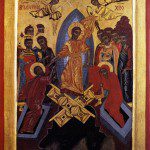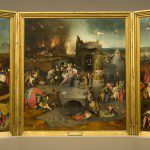![Noah's Ark by anonymous 13th century artist [Public domain], via Wikimedia Commons](https://wp-media.patheos.com/blogs/sites/637/2017/04/Ararat_Ms._11639_521a-299x300.jpg)
Whatever is good and true, whatever is able to help a person follow God in goodness, is thus seen as a gift of providence. Philosophy, therefore, was a providential gift to the Greeks, as St Clement of Alexandria wrote:
So, before the Lord’s coming, philosophy was an essential guide to righteousness for the Greeks. At the present time, it is a useful guide towards the reverence of God. It is a kind of preliminary education for those who are trying to gather faith through demonstration. “Your foot will not stumble,” says Scripture, if you attribute good things, whether Greek or Christian, to Providence.[8]
Moreover, through his love and grace, God is able to give freedom to creation and yet take all that freedom into accord so as to provide a good and sound end. That is, providence works for the betterment of all, taking into consideration the acts of all, so that what is bad and works against God’s justice can still be taken in by providence and used to establish God’s gracious desire. The fall of the angels, or the sin of any man or women, does not overturn God’s gifts in providence. God is able to turn it around and use it for some new, but different, good:
But the plans and actions of the rebel angels are partial only, and spring from a rotten disposition, like bodily diseases. But the Providence who directs the universe directs them to a healthy conclusion even if the original cause is disease ridden. [9]
How this is done, might be beyond us. “One should furthermore bear in mind that the ways of God’s providence are many, and that they can neither be explained in words nor grasped by the mind.”[10] But it is important to recognize that, whatever way God works, it is through the affirmation of freedom, and free will (however strong or weak it is). This is why, though a simple engagement and understanding of providence might lead to fatalistic conclusions, other engagements with it will see it as the way by which God sets up opportunities for all to receive his bountiful gift. Providence is not predestination, and God’s knowledge is not itself a force by which all things are bound to act in a particular way. “One should note that God foreknows all things but that He does not predestine them all.” [11] It would be fatalism, it would be predestination, if God in his foreknowledge does not offer opportunities but only one choice for each person. Even if he knows how people will choose, by giving them a choice, by giving them a real choice with a variety of possibilities providence can be seen as the means by which God sustains freedom. “One should, moreover, note that, while the choice of things that may be done rests with us, the accomplishment of the good ones is due to the co-operation of God, who in accordance with His foreknowledge justly co-operates with those who in right conscience choose the good.” [12] Providence provides for the opportunities by which those with free will can choose among a range of goods. This is what makes it providence:
Moreover, that He provides and provides will anyone might correctly learn from the following consideration. God alone is by nature good and wise. Consequently, in so far as He is good He provides, because one who does not provide is not good. Even men and brute beasts naturally provide for their own offspring, and the one that does not will incur blame. Then, in so far as He is wise He provides for existing things in the very best way.[13]
It is best that he provides freedom to his creatures, and so for providence to be providence, to offer things the best way, it is best to see providence as a means of providing such opportunity. This is why itis right to say God does not set in stone one possibility, one way of living for each person, but rather provides them a variety of ways by which they can then define themselves so that they can choose the way they will cooperate with grace and the kind of glory they will achieve with it. All this is for the glory of God, because God, in his bountiful goodness, provides what is best for all of us, including our free will.
[1] St. Bonaventure, Breviloquium. Trans. Erwin Esser Nemmers (St Louis, MO: B. Herder Book Company, 1946), 43.
[2] St. John of Damascus, “An Exact Exposition of the Orthodox Faith” in Writings. Trans. Frederic H. Chase Jr. (New York: Fathers of the Church, Inc., 1958), 260.
[3] St. John of Damascus, “An Exact Exposition of the Orthodox Faith,” 260.
[4] St. John of Damascus, “An Exact Exposition of the Orthodox Faith,” 261.
[5] Theodoret of Cyrus, On Divine Providence. Trans. Thomas Halton (New York: Newman Press, 1988), 31.
[6] St. Thalassios, “On Love, Self-Control and Life in Accordance with the Intellect” in The Philokalia: The Complete Text. Volume Two. Trans. G.E.H. Palmer, Philip Sherrard and Kallistos Ware (London: Faber and Faber, 312.
[7] Theodoret of Cyrus, On Divine Providence, 15.
[8] St. Clement of Alexandria, The Stromata. Trans. John Ferguson (Washington, DC: Catholic University of America Press, 1991), 41-2.
[9] St. Clement of Alexandria, The Stromata, 82.
[10] St. John of Damascus, “An Exact Exposition of the Orthodox Faith,” 262.
[11] St. John of Damascus, “An Exact Exposition of the Orthodox Faith,” 263.
[12] St. John of Damascus, “An Exact Exposition of the Orthodox Faith,” 262.
[13] St. John of Damascus, “An Exact Exposition of the Orthodox Faith,” 260.
Stay in touch! Like A Little Bit of Nothing on Facebook:
A Little Bit of Nothing













